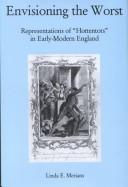
Envisioning the worst
By Linda Evi Merians
Subjects: Racism, Travelers' writings, English, English, Discovery and exploration, Travelers' writings, Public opinion, great britain, Khoikhoi (african people), Public opinion, Social life and customs, British, Description and travel, Khoikhoi (African people), History, Cape of good hope (south africa), description and travel
Description: "This book investigates how the early-modern English came to envision "Hottentots" as humanity's most base and beastly people.". "The descriptions of Africa's southern-most people that appear in travel narratives and collections, geography books, and other textbooks of learning written from the first contact between English sailors and the Cape Khoikhoi in 1591 until the establishment of the British Cape Colony in the 1820s only tell part of the story about the invention and construction of "Hottentots." No other indigenous society was described so negatively or appropriated for such extensive use in domestic discourses. Indeed, the countless number of literal and figurative "Hottentot" references that appear in eighteenth- and nineteenth-century journals, letters, poetry, novels, and drama, as well as in scientific, imperialist, political, and abolitionist writings demonstrate how the very idea of them figures in crucial ways in the early modern consciousness as well as in some of the period's most critical debates, especially those concerning race, nationalism, and gender.". "Tracing all the pre-colonial representations of "Hottentots" and "Hottentotism" operative in early-modern England allows us to see the birth and the development of a prejudice that became central to the nation. In their constructions of "Hottentots" the English found a way to vent their own fear, anger, and conflict about themselves and their society, particularly as they were transforming and redefining their nation as imperial Great Britain. The very invention of the "Hottentots" shows that the English needed to envision a worst people in order to imagine themselves as the world's most advanced people."--BOOK JACKET.
Comments
You must log in to leave comments.